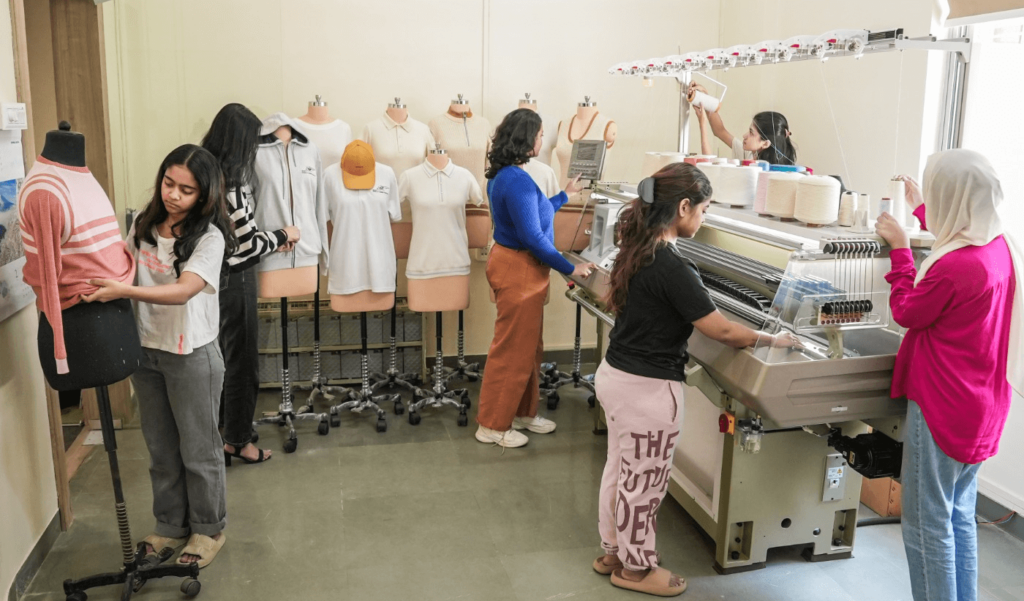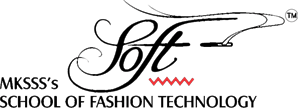Bachelor of Design Interdisciplinary

About us
Interdisciplinary Bachelor of Design (B.Des.) program can be a transformative experience, for enterprising youngsters aspiring to make their mark in the dynamic world of design. This undergraduate degree offers a unique blend of disciplines, fostering innovation and equipping students with diverse skills to thrive in various design sectors.
What is an Interdisciplinary Bachelor of Design?
An interdisciplinary Bachelor of Design program integrates multiple design disciplines, encouraging students to explore and combine areas such as graphic design, industrial design, fashion design, gemology and much more. This holistic approach not only broadens creative perspectives but also enhances problem-solving abilities, preparing graduates for the multifaceted challenges of the design industry.
Why Choose an Interdisciplinary Design Program?
Diverse Skill Set: By engaging with various design fields, students develop a versatile portfolio, showcasing their adaptability and broad expertise.
Innovative Thinking: The fusion of different design principles fosters creativity, leading to unique solutions and groundbreaking designs.
Industry Relevance: With the design industry constantly evolving, having knowledge across multiple disciplines ensures graduates remain competitive and relevant.
Personalized Learning: Students have the opportunity to tailor their education to their interests, focusing on areas they are passionate about while gaining insights into complementary fields.
Curriculum Highlights
- Foundation in Design Principles: Courses such as ‘Fundamentals of Design’ and ‘History of Art & Design’ lay the groundwork for understanding design aesthetics and their historical contexts.
- Technical Skill Development: Subjects like ‘Technical Drawing’ and ‘Computer Applications in Data Management and Presentation’ equip students with essential technical skills for precise design execution.
- Material Studies: Exploration of various materials through courses such as ‘Material Studies’ enables students to understand the properties and applications of different materials in design.
- Advanced Design Techniques: Advanced courses delve deeper into specialized design areas, fostering innovation and complex problem-solving abilities.
- Industry Exposure: The curriculum emphasizes industry interaction through workshops, seminars, and projects guided by experienced professionals, ensuring students are attuned to current industry trends.
- Research and Documentation: Courses focusing on research methodologies and documentation prepare students to conduct thorough investigations and present their findings effectively.
- Elective Specializations: The program offers elective courses, allowing students to tailor their education to their interests and career goals.
- Internship Opportunities: Structured internships provide practical experience, enabling students to apply their learned skills in real-world settings and gain valuable industry insights.
These curriculum components are designed to produce well-rounded design professionals capable of adapting to various sectors within the design industry.
Get dynamic design career
If you’re passionate about creativity and innovation, the Interdisciplinary Bachelor of Design program at MKSSS’s School of Fashion Technology (SOFT), Pune, is your gateway to a dynamic design career. With a comprehensive curriculum, hands-on industry exposure, and specialized skill development, this program equips you with the expertise to excel in diverse design fields.
Take the first step towards your dream career! Enroll today and become a part of a thriving community of aspiring designers. Apply now and shape the future of design with SOFT!
Course Syllabus
Semester I
| Sr.no. | Common Subject | Credits |
| 3021 | Fundamentals Of Illustration & Design Concept | 4 |
| 3022 | History Of Fashion (Indian & Western) | 4 |
| 3023 | Fashion Studies And Women’s Studies | 4 |
| Sr.no. | Electives (Any 2 ) | Credits |
|---|---|---|
| 3921 | Introduction To Pattern Making (Flat And Draping) | 4 |
| 3922 | Photography | 4 |
| 3923 | Textile Design -Foundation | 4 |
| 3924 | Element of Jewellery | 4 |
| 3925 | Introduction to textiles | 4 |
| 3926 | Introduction To Fashion Accessories | 4 |
Semester II
| Sr.no. | Common Subject | Credits |
|---|---|---|
| 4021 | Fashion Management, Marketing and Merchandising | 4 |
| 4022 | Computer Aided Rendering Technique | 4 |
| 4023 | Basic Fashion Illustration & Design Concept | 4 |
| Sr.no. | Electives (Any2) | Credits |
|---|---|---|
| 4921 | Basic Pattern Making (Flat And Draping) | 4 |
| 4922 | Surface Exploration Techniques | 4 |
| 4923 | Writing Skills | 4 |
| 4924 | Fabric Development | 4 |
| 4925 | Gemmology | 4 |
| 4926 | Perspective Drawing and Typography | 4 |
| 4927 | Graphic Design-Foundation | 4 |
| 4928 | Introduction To Garment Construction | 4 |
Semester III
| Sr.no. | Common Subject | Credits |
|---|---|---|
| 5021 | Computer Application In Fashion(2D) | 4 |
| 5022 | Indian Textile And Embroideries | 4 |
| Sr.no. | Electives (Any 3) | Credits |
|---|---|---|
| 5921 | Media Planning and Event Management | 4 |
| 5922 | Dyeing and Printing- Basic | 4 |
| 5923 | Fabric Development and Computerized Embroidery | 4 |
| 5924 | Advance Pattern Making (Flat, Draping And Grading) | 4 |
| 5925 | Basic Garment Construction | 4 |
| 5926 | Metals in Jewellery Design | 4 |
| 5927 | Diamond Grading | 4 |
| 5928 | Advertising Basic | 4 |
| 5929 | Fashion Styling and Fashion Photography | 4 |
Semester IV
| Sr.no. | Common Subject | Credits |
|---|---|---|
| 6021 | Introduction To Entrepreneurship and Intellectual Property Rights | 4 |
| 6022 | Craft Research And Design | 4 |
| 6023 | Fashion Forecasting | 4 |
| Sr.no. | Electives (Any 2) | Credits |
|---|---|---|
| 6921 | Creative Advertising | 4 |
| 6922 | Exhibition and Display Design | 4 |
| 6923 | Innovation in Textile Studies | 4 |
| 6924 | Advance Garment Construction | 4 |
| 6925 | Knits for Apparels and home furnishing | 4 |
Semester V
| Sr.no. | Common Subject | Credits |
|---|---|---|
| 7021 | Design Project – 1 | 4 |
| 7022 | Creative Pattern Making | 4 |
| 7023 | Quality Assurance Management | 4 |
| Sr.no. | Electives ( Any 2) | Credits |
|---|---|---|
| 7921 | Social Media and Digital Marketing | 4 |
| 7922 | Fashion Journalism And PR | 4 |
| 7923 | Computer aided Textiles Design | 4 |
| 7924 | Jacquard Weaving | 4 |
| 7925 | Men’s wear | 4 |
| 7926 | Women’s wear | 4 |
| 7927 | Brand Catalogue And Product Photography | 4 |
| 7928 | Gemmology And Diamond Grading | 4 |
Semester VI
| Sr.no. | Common Subject | Credits |
|---|---|---|
| 8021 | Design Project – 2 (Design Collection ) | 4 |
| 8022 | Retail and Visual Merchandising | 4 |
| 8023 | Professional Skills and Portfolio Development | 4 |
| Sr.no. | Electives ( Any 2) | Credits |
|---|---|---|
| 8921 | Woven Design | 4 |
| 8922 | Print Design | 4 |
| 8923 | Publication Design | 4 |
| 8924 | Creative Advertising | 4 |
| 8925 | Luxury Brand Management | 4 |
| 8926 | Visual Merchandising and Styling in Jewellery Design | 4 |
| 8927 | Fashion Styling And Costume Designing© | 4 |
(A) Core Subjects (B) Applied Subjects (C) Foundation Subjects (D) Electives
Admission Procedure
Eligibility criteria for the 1st year – B. Design
- XII th Pass in any Stream – Arts/Commerce/Science/Home Science/ Minimum Competency Vocational Course (MCVC) including National Institute of Open Schooling (NIOS).
- Maharashtra State Board of Technical Education (MSBTE)/ State Govt. Technical Education full time diploma of minimum 3 years after Std. X ( any stream)
- For NRI & Foreign students with equivalence from Association of Indian Universities (AIU), New Delhi
Criteria for selection of students for the 1st year
50% weightage for SOFT’s CET Marks , 50% weightage for XII Std./ Equivalent marks. (Minimum Eligibility 50%)
Eligibility criteria for 2nd year
- Three year Diploma, Dress making and Garment Manufacturing or Equivalent recognized by All India Council for Technical Education (AICTE) with Bridge course of 8 credits with additional Fees.
- Five year Diploma in Fine Arts recognized by the State Technical Board with Bridge course of 8 credits
- Successful completion of 1st year Degree from National Institute of Fashion Technology (NIFT)
- Successful completion of 1st year Degree of any B Design Fashion Or Equivalent Course offered by Indian Universities / Foreign university with equivalence from AIU.
The following are the subjects under bridge course
- Fashion Studies – 4 Credits Th2 Pr2
- Material Studies – 2 Credits Pr.
- Technical Drawing – 2 Credits Pr.
The prescribed bridge course needs to be completed by the candidate within the period of 60 days from the date of admission.
Admission to such candidate will be given up to 30 days from the commencement of the Semester.
Eligibility for admission to third and fourth year of B. Design will be according to the passing criteria and rules for ATKT as prescribed by Controller of Examinations
Exam Pattern
B Design Examination Schedule for University Exam for V, VI, VII & VIII.
The evaluation pattern is as follows as per passed in the Academic Council Meeting held on 20th September 2013.
| Proposed evaluation pattern for new modular structure syllabus | ||||||
| Credit | Credit | Internal | Internal | External | External | Total |
| TH | PR | TH | PR | TH | PR | |
| 4 | 0 | 25 | – | 75 | – | 100 |
| 3 | 1 | 15 | 10 | 60 | 15 | 100 |
| 2 | 2 | 25 | 25 | 50 | 25 | 100 |
| 0 | 4 | 0 | 100- Continuous assessment | – | – | 100 |
| 0 | 4-university Exam | – | 25 | – | 75 | 100 |
- All Practical subject exams except University level examination will have continuous assessment.
- University level Practical Examination will be as per the table given above.
Evaluation Pattern For SNDT Women’s University
- The evaluation pattern for SNDT Women’s university is based on the credits allotted to the subject.
- For first 4 semesters the evaluation is conducted on college level and next four semesters it is conducted on university level. The evaluation includes Internal and external marking.
- For College level subjects, the evaluation Pattern is Practical – Continuous Evaluation and theory – 25 marks internal (Class assignments, Class test) and 75 marks external exam. For university level subjects, the evaluation Pattern is theory and Practical – 25 marks internal (Class assignments, Class test) and 75 marks external exam.
- Separate passing is required for internal and external exams.
- An ATKT (Allowed to keep terms)criterion is 40% on total Heads.
Duration:
2years (Post Graduate)
Fees:
Rs.2,00,000/year
Title will come here. Title will come here. Title will come here. Title will come here
Student's Review

As a Bachelor of Design, Fashion Design student at SOFT, my experience has been nothing short of transformative. The curriculum strikes the perfect balance between creativity and technical skill, encouraging us to push boundaries while honing our craft. The faculty, comprised of industry professionals, offer invaluable insights and mentorship, helping me refine my personal style and understand the complexities of the fashion world.

As a proud graduate of School of Fashion Technology, I can confidently say that this institution has been instrumental in shaping my future as a fashion professional. The blend of creativity and technical training I received here was truly world-class. From hands-on projects to industry exposure, every experience was designed to push my limits and help me discover my unique voice in fashion. The faculty’s expertise and mentorship played a huge role in refining my skills and igniting my passion. I am leaving with not only a strong portfolio but also the confidence to thrive in the fashion industry. I’m forever grateful for my time here!

I am a 2024 batch pass-out. I started my life in SOFT during COVID, but even when the world was shut, SOFT continued to persist for better education for its students. The faculty is top notch and possess industry experience. The practical as well as theory subjects were taught in a way which helped us create interest.
During the internship and placement process, we were given various opportunities. I interned with Landmark Group where I could use everything I had learned during my time in SOFT and got extremely good exposure to the industry and its intricacies.
I was placed with Myntra as a kids wear designer even before I gave my final exam. I am extremely thankful to our TPO, Ms. Smita Pattanaik ma’am for her constant guidance and support.
I also thank our Principal Dr. Ms. Garima Bhalla, our CC Dr. Yogesh Bokil and all the faculties who helped me reach where I am today.

People often pursue professional courses to gain an edge in their careers, but my experience at SOFT went far beyond the curriculum. I gained invaluable lessons in leadership, sisterhood, and accountability. It was at SOFT that I discovered my true passion for fashion styling and designing. This foundation was instrumental in shaping my career. Today, as a professional Design Thinker, I am deeply grateful for the strong base SOFT provided. I’ve had the privilege of learning from dedicated teachers who invested their heart and soul into their students. Now, as a successful fashion stylist and designer working with renowned clothing and jewelry brands, I attribute my determination, self-confidence, and commitment to the exceptional experience I had at the School of Fashion Technology

It was my dream to complete my designing from School of Fashion Technology, [SOFT] and it is completed with really great experience. I took almost 3 years of gap between my education just for SOFT and it was a really good decision of mine. The college is perfectly perfect with all the facilities, good infrastructure and mind-blowing faculties.
I can say all these things because now whenever I say I am a SOFT Student how people see us. Now I am working as a teacher in Nagpur Cadence Academy just because of the support and good education of SOFT.
